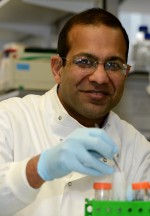
Dr Yaohe Wang
Grant made in 2009 Award RoundDr Wang has adapted the vaccinia virus, used to treat smallpox, as a potential therapeutic for treating pancreatic cancer.

All the research we support is funded entirely by public donations. To date, 73 projects have been funded, with a total value of over £15.6 million. These are focused on early diagnosis of pancreatic cancer and the development and monitoring of new treatments.

Dr Wang has adapted the vaccinia virus, used to treat smallpox, as a potential therapeutic for treating pancreatic cancer.

This research aims to screen and select antibodies to tumour glycolipids that will lead to novel cancer therapeutics.

This team is exploring therapies designed to stop Fibroblast Growth Factors from working properly. FGFs are known to promote tumour growth.

Dr Halldén's team is investigating the safety, efficacy and mechanisms of a modified adenovirus against cancer cells.

Professor Falasca's team is investigating the specific role of a particular type of enzyme called p110gamma in pancreatic cancer.

The team is investigating the potential of a molecule called αvβ6 in cancer imaging. The molecule could help surgeons identify metastatic tumours more efficiently and accurately.

Dr Saleem will use PET imaging to gain new insights into pancreatic cancer.

This project aims to develop a panel of urinary biomarkers that can be used to test for pancreatic cancer.

The aim of this PhD study is to decipher the role of a protein called S100PBPR in the pathobiology of pancreatic cancer and assess its validity as a diagnostic and/or prognostic tool.

Dr Costello is looking at the role of two proteins in the growth and spread of pancreatic cancer, with the ultimate goal of using this to develop a treatment for the disease.